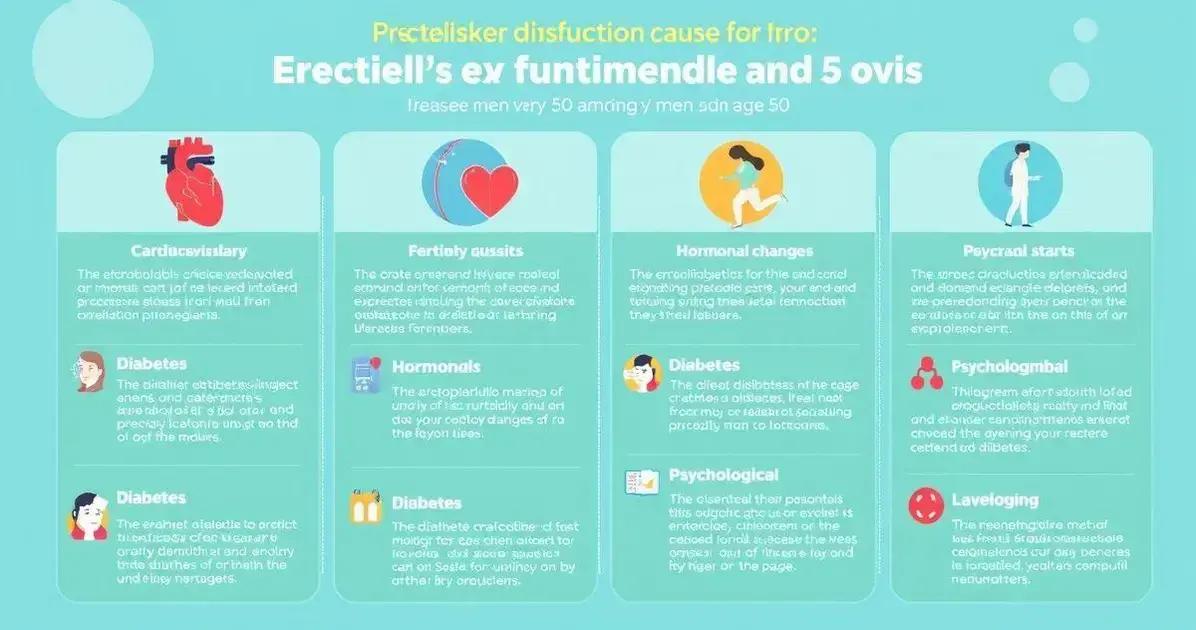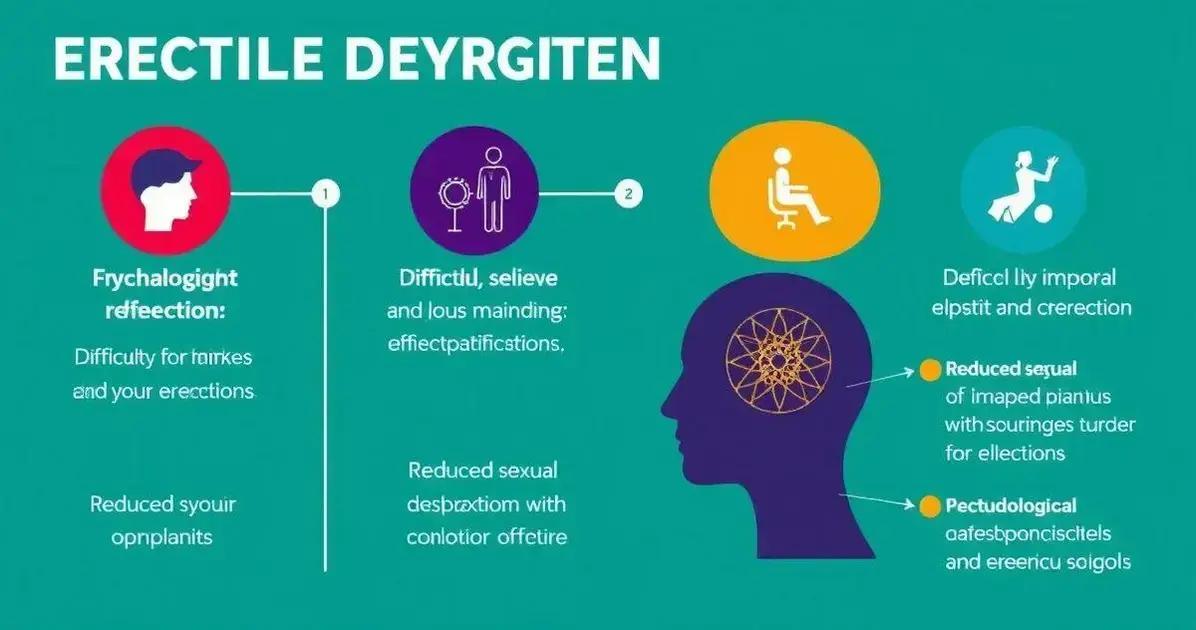Erectile dysfunction (ED) is a common condition affecting many men over 50, often caused by factors such as cardiovascular disease, diabetes, and psychological issues. Symptoms include difficulty achieving or maintaining an erection. Treatment options range from medications and vacuum devices to lifestyle changes and counseling. Preventive measures like maintaining a healthy weight, exercising regularly, and managing stress can help reduce the risk of ED.
Erectile dysfunction (ED) is a significant concern for many men over 50. Understanding the 10 facts about erectile dysfunction can empower individuals to address their health proactively. This common issue can stem from various causes such as age, health conditions, and lifestyle choices. Recognizing the symptoms is crucial, as many men might feel hesitant to discuss it. In this article, we’ll delve into the common causes, symptoms, available treatments, and preventive measures every man should consider.
Understanding Erectile Dysfunction

Erectile dysfunction (ED) is a condition that affects many men, especially those over 50. It is characterized by the inability to achieve or maintain an erection sufficient for satisfactory sexual performance. This issue can lead to feelings of inadequacy and frustration, impacting not just a man’s self-esteem but also his relationships.
Why Understanding ED is Important
Understanding erectile dysfunction is essential for several reasons. First, it can serve as a warning sign for underlying health issues, such as cardiovascular disease, diabetes, or hormonal imbalances. Second, many men do not realize that ED is common and that treatment options are available. This lack of awareness can delay seeking the necessary help.
Physical and Psychological Factors
ED can be caused by a variety of factors. Physical causes include chronic illnesses, side effects from medications, and lifestyle choices such as smoking or excessive alcohol consumption. Psychological factors, including stress, anxiety, or depression, can also significantly impact a man’s ability to engage in sexual activity. In many cases, it is a combination of both physical and psychological issues that leads to ED.
The Impact of Aging
Aging is one of the primary risk factors for ED. As men age, hormonal changes occur, and blood flow may diminish, leading to difficulties with erections. Furthermore, the risk of developing medical conditions that can contribute to ED increases with age, making this a more prevalent issue for men over 50.
Importance of Seeking Help
If you or someone you know is experiencing symptoms of erectile dysfunction, it is crucial to seek help. Open communication with a healthcare provider can lead to a proper diagnosis and treatment plan. Many men fall into the trap of believing that ED is just a normal part of aging, but addressing it can lead to improved quality of life.
Common Causes in Men Over 50

There are several common causes of erectile dysfunction in men over 50. Understanding these factors can help men recognize and address this issue effectively.
1. Cardiovascular Disease
One of the leading causes of ED is cardiovascular disease. As men age, the risk of heart disease increases, affecting blood flow to the penis and making erections difficult.
2. Diabetes
Diabetes can lead to nerve and blood vessel damage, contributing to erectile dysfunction. Men with diabetes are more likely to experience ED due to how it affects their body’s ability to regulate blood sugar.
3. Hormonal Changes
As men age, testosterone levels naturally decline. Low testosterone can lead to diminished libido and difficulties achieving or maintaining an erection.
4. Medications
Certain medications, such as those for high blood pressure, depression, or anxiety, can have side effects that include erectile dysfunction. Consulting with a healthcare provider about medication side effects is crucial.
5. Psychological Factors
Stress, anxiety, and depression are significant contributors to ED. Mental health plays a crucial role in sexual function, and seeking help for psychological issues can be beneficial.
Recognizing these common causes can empower men to seek appropriate treatment and improve their sexual health.
Symptoms to Watch For

Recognizing the symptoms of erectile dysfunction is crucial for men over 50. Being aware of these signs can help individuals gain a better understanding of their sexual health.
1. Difficulty Achieving an Erection
One of the primary symptoms to watch for is difficulty in getting an erection during sexual activity. This may happen occasionally, but if it becomes a frequent occurrence, it could indicate ED.
2. Trouble Maintaining an Erection
Another sign is the inability to maintain an erection during sex. A man may start strong but then lose the erection before completion, which can be frustrating and concerning.
3. Reduced Sexual Desire
Men may notice a decrease in their libido or sexual desire. This can sometimes be linked to lower testosterone levels or psychological factors like stress and anxiety.
4. Changes in Orgasm
Some men experience changes in orgasm, including feeling less intense pleasure or having difficulty reaching orgasm. These changes can affect sexual satisfaction and confidence.
5. Psychological Symptoms
Feelings of embarrassment, anxiety, or low self-esteem related to sexual performance can also be significant symptoms. Recognizing that these feelings can accompany ED is critical for seeking help.
Monitoring these symptoms can aid in early intervention and treatment, improving both sexual health and overall well-being.
Treatment Options Available

There are several treatment options available for erectile dysfunction (ED) that men over 50 can consider. Seeking help from a healthcare provider is essential to find the most suitable option.
1. Oral Medications
Oral medications, such as Viagra, Cialis, and Levitra, are commonly prescribed for ED. These medications work by increasing blood flow to the penis, helping men achieve an erection when sexually stimulated.
2. Vacuum Erection Devices
Vacuum erection devices (VEDs) create a vacuum around the penis, pulling blood into it and facilitating an erection. Once an erection is achieved, a constriction ring is placed at the base to maintain it.
3. Penile Injections
For some men, penile injections may be effective. These involve injecting a medication directly into the penis to promote blood flow and create an erection. It is usually guided by a healthcare professional initially.
4. Hormone Therapy
Hormone therapy can be an option for men with low testosterone levels. This may involve testosterone replacement therapy (TRT) to help restore hormone levels and improve sexual function.
5. Psychological Counseling
If psychological factors are contributing to ED, counseling or therapy can be beneficial. Talking with a mental health professional can help address anxiety, depression, or relationship issues that affect sexual performance.
Exploring these treatment options can lead to improved sexual health and confidence for men facing erectile dysfunction.
Preventive Measures to Consider

Taking proactive steps towards preventive measures for erectile dysfunction is essential for men over 50. Adopting healthy habits can greatly improve sexual health.
1. Maintain a Healthy Weight
Being overweight can increase the risk of erectile dysfunction. Eating a balanced diet rich in fruits, vegetables, whole grains, and lean proteins can help maintain optimal weight and improve overall health.
2. Regular Exercise
Physical activity plays a crucial role in improving blood circulation and reducing risk factors for ED. Aim for at least 30 minutes of exercise most days of the week. Activities like walking, swimming, or cycling can be beneficial.
3. Stop Smoking
Quitting smoking can significantly enhance blood flow and improve sexual performance. Smoking harms blood vessels and can lead to ED, so seeking support to quit can be life-changing.
4. Limit Alcohol Consumption
Excessive alcohol intake can affect sexual performance. Limiting alcohol to moderate levels can reduce the risk of erectile dysfunction and promote a healthier lifestyle.
5. Manage Stress
Stress and anxiety can negatively impact sexual health. Finding healthy ways to manage stress, such as through meditation, yoga, or spending time with loved ones, can help reduce anxiety related to sexual performance.
Implementing these preventive measures can support overall health and may reduce the risk of erectile dysfunction in men over 50.
Understanding and Addressing Erectile Dysfunction
Erectile dysfunction is a common issue that many men over 50 face, but it is important to know that help is available. By understanding the facts about this condition, including its causes, symptoms, and treatment options, men can take control of their sexual health.
Implementing preventive measures, such as maintaining a healthy lifestyle and managing stress, is vital in reducing the risk of ED. Awareness and open communication with healthcare providers can lead to effective treatment plans.
Ultimately, seeking help not only improves sexual health but also enhances overall well-being and relationships. Men should feel empowered to address this topic without shame and prioritize their health for a better quality of life.
FAQ – Frequently Asked Questions About Erectile Dysfunction
What is erectile dysfunction?
Erectile dysfunction (ED) is the inability to achieve or maintain an erection sufficient for satisfactory sexual performance. It is common in men over 50.
What are the common causes of erectile dysfunction?
Common causes include cardiovascular disease, diabetes, hormonal changes, psychological factors, and certain medications.
What symptoms should I look for if I think I have ED?
Symptoms include difficulty achieving or maintaining an erection, reduced sexual desire, and changes in orgasm.
What treatment options are available for erectile dysfunction?
Treatment options include oral medications, vacuum erection devices, penile injections, hormone therapy, and psychological counseling.
Are there preventive measures I can take to reduce the risk of ED?
Yes, maintaining a healthy weight, regular exercise, quitting smoking, limiting alcohol, and managing stress are important preventive measures.
Can erectile dysfunction affect my mental health?
Yes, experiencing ED can lead to feelings of embarrassment, stress, or anxiety, which may impact overall mental health and self-esteem.













